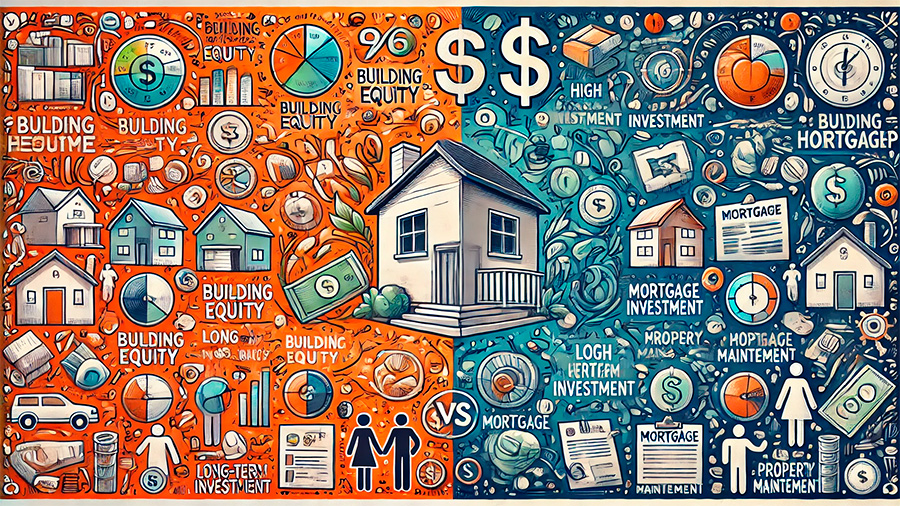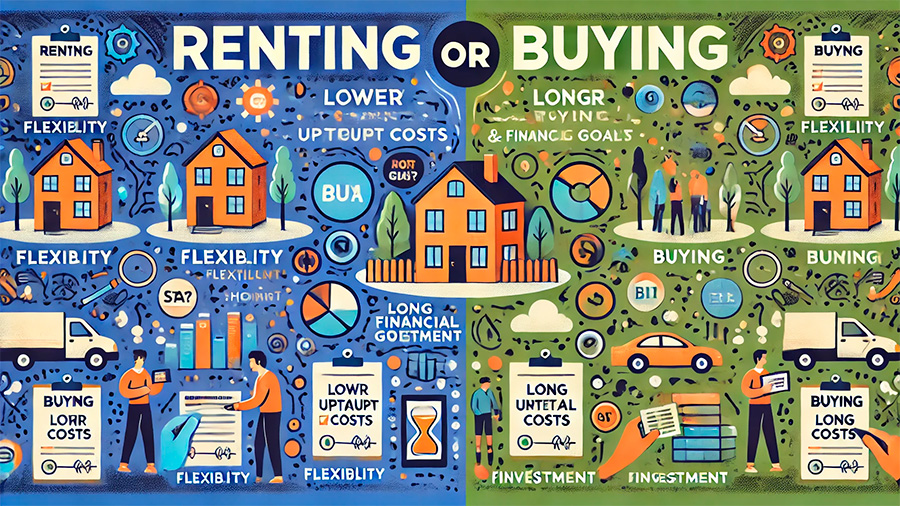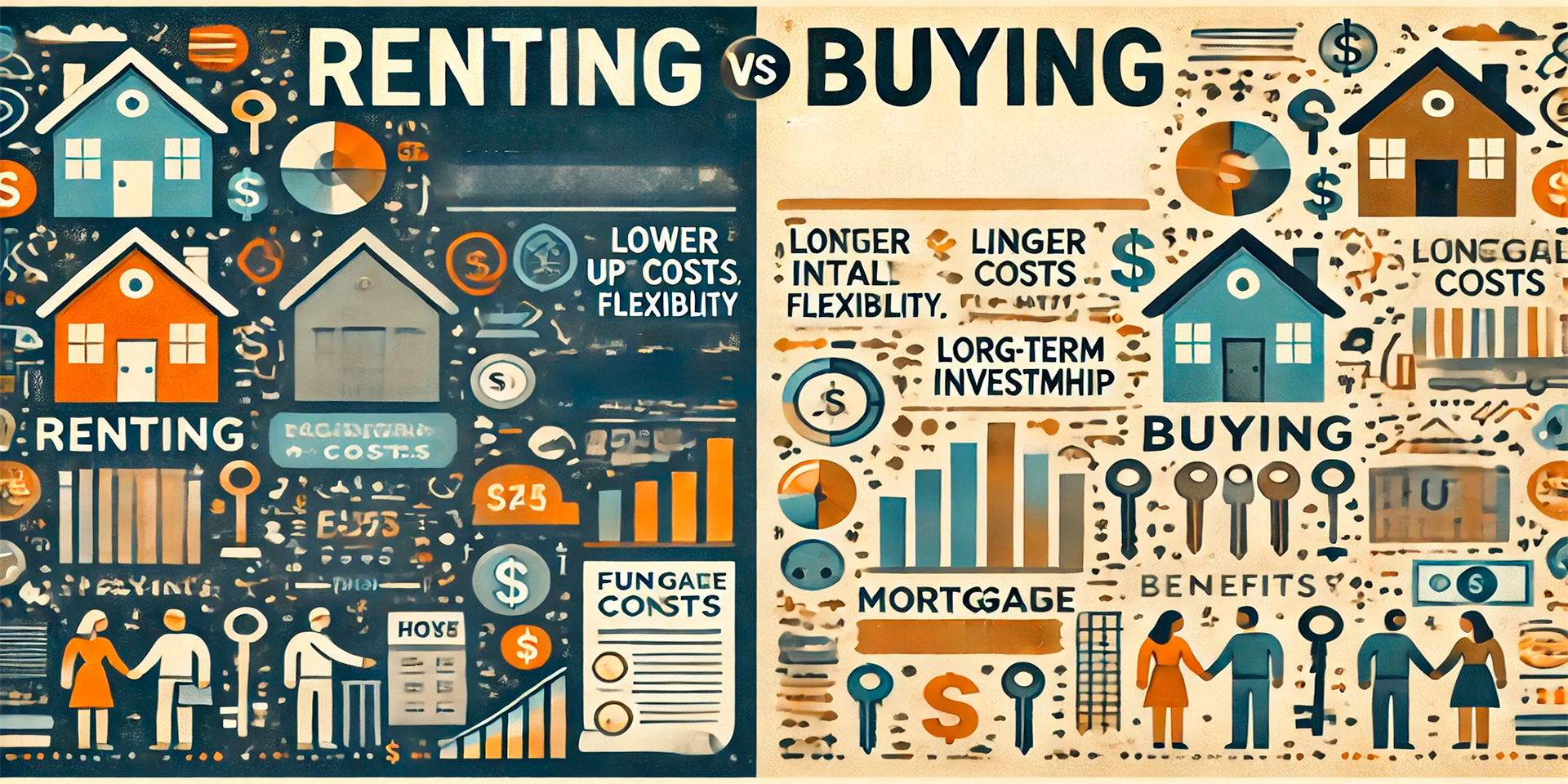Choosing between renting and buying a home is one of the most significant financial decisions many individuals face. Both options have distinct financial implications, and the best choice depends on your long-term goals, current financial situation, and lifestyle preferences. While homeownership offers the potential for building equity, renting can provide flexibility and lower upfront costs. This article will guide you through the key factors to consider when deciding whether renting or buying aligns best with your financial objectives.
Understanding the Financial Implications of Renting
Renting is often seen as the more flexible option, especially for those who may not be ready for the long-term commitment of homeownership. When you rent, you’re essentially paying for the right to live in a property without the responsibility of maintaining it or worrying about property taxes. However, renting has its own set of financial pros and cons.
Lower Initial Costs
One of the most attractive aspects of renting is the lower upfront cost compared to buying a home. Renters typically need to pay only a security deposit and the first month’s rent, while homebuyers must come up with a down payment, closing costs, and often other fees associated with securing a mortgage.
Renting can be an ideal choice for those who don’t have a large amount of savings for a down payment or who need to maintain liquidity for other financial goals. The money saved by avoiding large upfront costs can be used for investing, paying off debt, or building an emergency fund.
Fixed Monthly Expenses
When you rent, your monthly housing costs are often more predictable. Rent payments remain relatively stable, especially if you have a lease that locks in your rent for a set period of time. This predictability can make budgeting easier, as renters don’t need to worry about the fluctuating costs of home maintenance, property taxes, or homeowners insurance.
However, it’s important to note that rents can increase over time, particularly in high-demand areas. If you’re planning to stay in one place for many years, rising rent prices could eventually exceed the costs of a fixed mortgage payment.
No Maintenance Responsibilities
Renting also eliminates the financial burden of home maintenance and repairs, which are typically the responsibility of the landlord. This can save renters significant amounts of money over time, as homeowners are responsible for ongoing upkeep such as roof repairs, plumbing issues, and appliance replacements. For renters, any necessary repairs are usually handled at no additional cost, allowing them to focus on other financial goals.

The Financial Benefits and Challenges of Buying
Buying a home is often considered a long-term investment, as it provides the opportunity to build equity over time. However, homeownership comes with significant upfront and ongoing costs that can impact your overall financial plan.
Building Equity Over Time
One of the primary financial advantages of buying a home is the ability to build equity. Equity represents the portion of the home you actually own, which increases over time as you pay down your mortgage. Unlike renting, where your monthly payments go toward your landlord’s income, mortgage payments gradually increase your ownership stake in the property.
As home values appreciate over time, homeowners can benefit from an increase in their equity, which can be leveraged for future financial opportunities, such as securing a home equity loan or selling the property at a profit. However, it’s important to remember that real estate markets can fluctuate, and home values may not always rise.
Potential for Long-Term Financial Stability
Owning a home can offer long-term financial stability, particularly if you secure a fixed-rate mortgage. With a fixed mortgage, your monthly payment remains the same throughout the loan term, providing predictability that renters may not have. This stability can be especially beneficial during periods of inflation or rising rental prices.
Over time, as you pay off your mortgage, you’ll eliminate monthly housing payments altogether, potentially reducing your living expenses in retirement. This long-term stability is one of the reasons many people see homeownership as a way to secure financial independence.
Significant Upfront and Ongoing Costs
The biggest challenge of buying a home is the substantial upfront cost. Buyers typically need a down payment, which can range from 3% to 20% of the home’s purchase price, depending on the type of mortgage and the lender’s requirements. Additionally, there are closing costs, which can add another 2% to 5% of the purchase price, as well as fees for home inspections, appraisals, and other related expenses.
Beyond the initial costs, homeownership comes with ongoing financial responsibilities, including property taxes, homeowners insurance, and maintenance. Homeowners must budget for both routine upkeep, such as lawn care or minor repairs, and unexpected expenses like replacing a roof or fixing a major plumbing issue. These ongoing costs can make homeownership more expensive than renting, especially in the early years.

How to Decide Based on Your Financial Goals
Deciding whether to rent or buy ultimately comes down to your financial goals and priorities. To make the best choice, consider the following key factors:
Short-Term vs. Long-Term Plans
If you’re planning to stay in one location for only a few years, renting is likely the better option. The flexibility of renting allows you to move easily without worrying about selling a home or dealing with the complexities of the real estate market. Additionally, renting can give you time to build up savings for a down payment and improve your credit score before making a long-term commitment to homeownership.
On the other hand, if you’re planning to stay in one place for a longer period—typically five years or more—buying a home may offer more financial benefits. Over time, the equity you build and the potential appreciation of your property’s value can offset the higher initial costs of homeownership. In many cases, owning a home for a long time allows you to benefit from rising home values and increasing equity, making it a better long-term investment.
Financial Flexibility and Liquidity
If maintaining financial flexibility is a priority, renting may be the better option. Renting allows you to avoid large upfront costs, and you won’t have to worry about the ongoing expenses of property maintenance. This flexibility can free up your finances for other investments, saving for retirement, or pursuing entrepreneurial ventures.
Buying a home, while potentially a good long-term investment, ties up a significant portion of your money in an illiquid asset. If you need access to your savings or may face fluctuating income in the near future, renting can provide greater liquidity, allowing you to adapt to changing financial circumstances.
Desire for Stability vs. Mobility
If your financial goals include stability and the desire to build roots in a community, buying a home may be the right choice. Homeownership can provide a sense of permanence, allowing you to establish long-term relationships with neighbors, schools, and local organizations. Additionally, owning a home can provide stability during retirement, as you can eventually live without monthly housing costs once the mortgage is paid off.
Conversely, if you prioritize mobility or expect significant life changes, such as job relocation or family changes, renting offers greater flexibility. Renting allows you to move more easily without the financial burden of selling a property or dealing with the complexities of the housing market.
Evaluating the Current Market Conditions
Current market conditions also play a crucial role in the rent-versus-buy decision. In periods of low mortgage interest rates, buying may be more attractive, as lower rates make home loans more affordable. However, if home prices are rising rapidly in your desired area, renting may offer a more financially sound option until prices stabilize.
On the other hand, if rental prices are climbing, it may make sense to lock in a fixed mortgage rate by buying a home. Rising rents can make renting more expensive in the long run, while buying can offer more predictable housing costs.
Conclusion: Weighing Your Options Based on Financial Goals
Deciding between renting and buying is a highly personal choice that depends on your financial goals, lifestyle preferences, and the current market environment. Renting offers flexibility, lower upfront costs, and the opportunity to maintain financial liquidity, making it ideal for those with short-term plans or fluctuating income. Buying, however, provides long-term financial stability, the opportunity to build equity, and the potential for property value appreciation, which can make it a better option for those with long-term plans and the financial means to handle the responsibilities of homeownership.
To make the best decision, carefully assess your financial goals, consider the potential benefits and drawbacks of both renting and buying, and evaluate the current market conditions. Whether you choose to rent or buy, aligning your decision with your financial objectives will help you achieve long-term stability and success.

